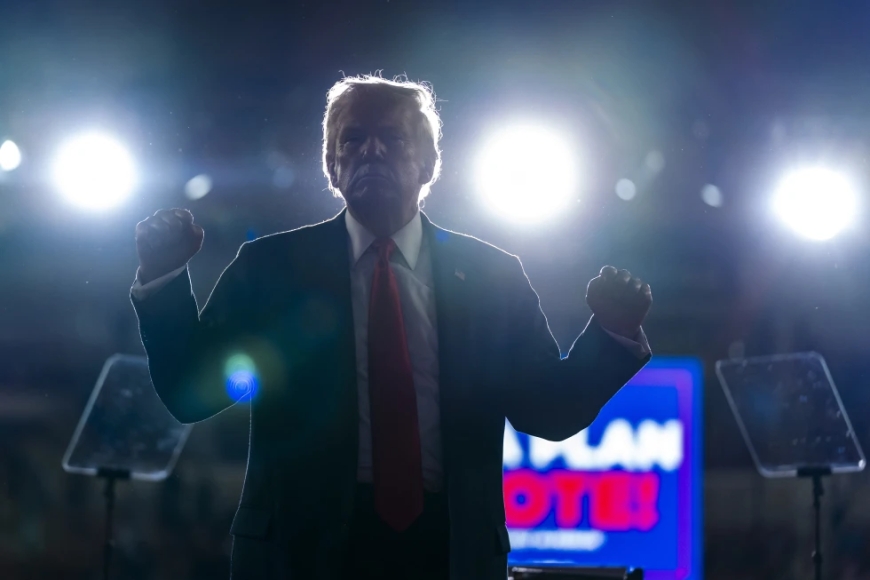Trump Centers 2024 Campaign on Kamala Harris’ Race, Stirring Controversy Among Republicans

From the onset of his political career, Donald Trump has leveraged racial tensions to galvanize his base. This week, the former president once again sparked controversy by falsely claiming Vice President Kamala Harris, of Jamaican and Indian descent, only "turned Black" for political gain. His comments drew outrage from Democrats and discomfort from some Republicans, highlighting a potential fault line within the GOP as the 2024 election approaches.
A Trump campaign adviser, speaking on the condition of anonymity, downplayed the focus on Harris's racial identity, suggesting the campaign's strategy would pivot to her liberal policy stances, including her records on the Southern border, crime, the economy, and foreign policy. Despite this, Trump doubled down on his racial critique, sharing a photo of Harris in traditional Indian attire on his social media platform.
Senator Cynthia Lummis, a Wyoming Republican and Trump supporter, expressed concern over the racial rhetoric, stating, "People’s skin color doesn’t matter one iota." This sentiment was echoed by other Republican lawmakers, who fear such tactics could backfire.
Revisiting an Old Playbook
Trump's attacks on Harris come shortly after President Joe Biden endorsed her, transitioning Trump’s campaign focus from an elderly white incumbent to a younger, dynamic Black woman who has energized the Democratic base. During his appearance at the National Association of Black Journalists convention, Trump insinuated Harris misled voters about her race. His comments were met with mixed reactions, even among his supporters.
At a subsequent Pennsylvania rally, Trump's team displayed old headlines referring to Harris as the "first Indian-American senator," while his running mate, Senator JD Vance, labeled Harris a "chameleon" who shifts her identity for convenience.
Impact on the 2024 Election
Harris, who attended Howard University and is a member of the Alpha Kappa Alpha sorority, has consistently embraced both her Black and Indian heritage. Trump’s team contends that focusing on her racial identity could alienate Black voters, a demographic where Trump has struggled to gain traction. Lynne Patton, a senior Trump campaign adviser, argued that their message on economic and border security issues could resonate more effectively with voters.
However, veteran Republican pollster Frank Luntz cautioned that racially driven attacks might repel crucial swing voters. "If it’s racially driven, it will backfire," Luntz warned, noting the evolving political landscape since Trump first questioned President Barack Obama's citizenship.
Eugene Craig, former vice chair of the Maryland Republican Party and a Harris supporter, criticized Trump's approach, stating, "The one thing that Black folks will never tolerate is disrespecting Blackness."
A History of Racial Attacks
Trump’s political history is marked by racially charged rhetoric. He was a prominent figure in the "birther" movement against Obama, characterized Mexican immigrants as criminals, and suggested stopping immigration from "shithole" countries. These patterns of behavior continue to shape his public persona and campaign strategy.
GOP Response
Some Republican voices, including conservative commentator Ben Shapiro, have urged the party to focus on substantive criticisms of Harris's policies rather than her racial identity. "Winning the 2024 election might be more important than having this silly and meaningless conversation," Shapiro noted on social media.
Democratic Strategy
A Harris campaign adviser described Trump's attacks as an opportunity to highlight the chaos and division he brings, advising Democrats to stay focused on key policy issues. Harris addressed Trump's comments at a gathering of a historically Black sorority, dismissing them as “the same old show: the divisiveness and the disrespect.”
Voter Reactions
Trump's rhetoric appears to resonate with segments of his base. Jim Abel, a 65-year-old retiree, echoed Trump’s sentiments, claiming Harris is inauthentic in her racial identity. However, such views may not be universally shared within the Republican electorate, potentially complicating Trump's broader appeal.
As the 2024 election approaches, the focus on Harris's race underscores a deeper strategic divide within the GOP and highlights the complexities of American racial politics in a rapidly changing electoral landscape













































